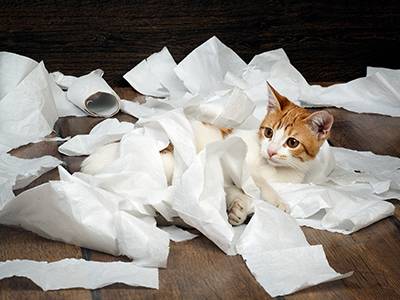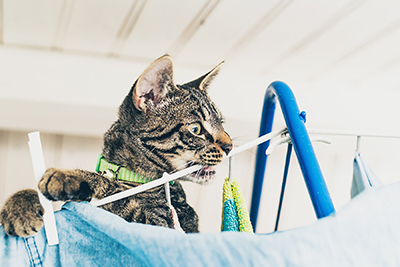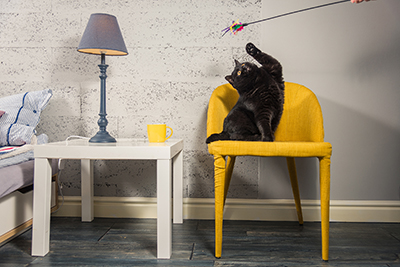Taking a few effective measures can help keep your cats safe and sound.

©kozorog/Adobe Stock
There are a variety of reasons cats might chew on and/or eat nonfood items. Felines might chew if they are bored or have too much excess energy. Highly stressed or anxious cats often chew as a self-soothing technique. Chewing on or ingesting nonfood items can not only be destructive, it can be very hazardous to a cat’s health. This is why it’s best to stop your cat from chewing on such items.
Read more about our unique Cat Training course.
Cats can be very effective paper-shredding “machines” and can do an efficient job of tearing up confidential and personal documents you don’t want destroyed. And, while it can be amusing to watch them chase and tear paper balls to shreds or unravel toilet paper rolls, there is a cautionary side to these behaviors. Ingesting paper can be dangerous and even life-threatening to felines.
When opening packages, you should remove the purchase and instantly discard the box and its cat-attractive contents. In addition to the box to chew on, there’s the temptation of the paper invoice, Styrofoam packing chips and/or inflated plastic bags.
Cats are also very adept at going on fishing expeditions into open bathroom trashcans. Many felines love diving into discarded tissues to snag cotton swabs and bite off their heads. Dental floss presents another serious issue and should never be left lying around. If ingested, it can harm a cat’s intestines and result in a life-threatening emergency. Securing every trashcan in a home is the solution to preventing these scrummaging expeditions.

©evakid/Adobe Stock
Electrical cords and cables are another potential hazard. Most homes have a plethora of cords, from the entertainment system to the computer setup to the vacuum cleaner and other appliances. A cat could easily bite through a cord and cause burns to the mouth area as well as singe her whiskers. And, the frayed wires could also cut her tongue or gums. Ingesting the cords’ covering can be harmful and contact with the wires can result in electrocution. To keep your cats safe, you should use protective cord or cable covers; some of which are infused with citronella to deter chewing.
Many felines also have a penchant for chewing on houseplants, which is why you need to ensure your plants are of a non-toxic variety. Sprinkling leaves with ordinary ground or cayenne pepper, or misting them with non-toxic bitter spray can help keep cats out of your plants. With the holidays approaching, you could also use these deterrents on holiday tree skirts as well as the lower branches to discourage your cats from chewing on or climbing into them.
Chewing and sucking on fabric is also relatively common in cats; wool can be a favorite substance for felines to gnaw on. Fabric chewing might be a sign of obsessive compulsive disorder. You can use the above mentioned deterrents to keep your cat from chewing on furniture, drapes and other household fabrics. You should also secure closets, cupboards and drawer so that you cat is unable to sneak in and start chewing up garments.

©liukovmaksym/Adobe Stock
In addition to making items unpleasant to chew on, you should help your cat expend any excess energy by playing with her more often. You should also give her a range of toys to keep her occupied, especially solo interactive ones, such as puzzle feeders and ball-and-track toys.
Sometimes eating nonfood items (a condition called pica) can be caused by a medical issue, such as hyperthyroidism or nutrient deficiency. If your cat is chewing and eating nonfood items, you should take her to a veterinarian to rule out any underlying medical causes.
About the Author: Sandy Robins is the 2013 winner of the “Excellence in Journalism and Outstanding Contribution to the Pet Industry Award.” Her work appears on many of the country’s leading pet platforms, such as MSNBC.com, MSN.com and TODAYShow.com. She is a regular contributor and columnist in multiple national and international publications, including Catster, as well as the author of the award-winning books “Fabulous Felines: Health and Beauty Secrets for the Pampered Cat” and “For The Love of Cats.” Learn more about Sandy on her website or Facebook page. #welovecats





